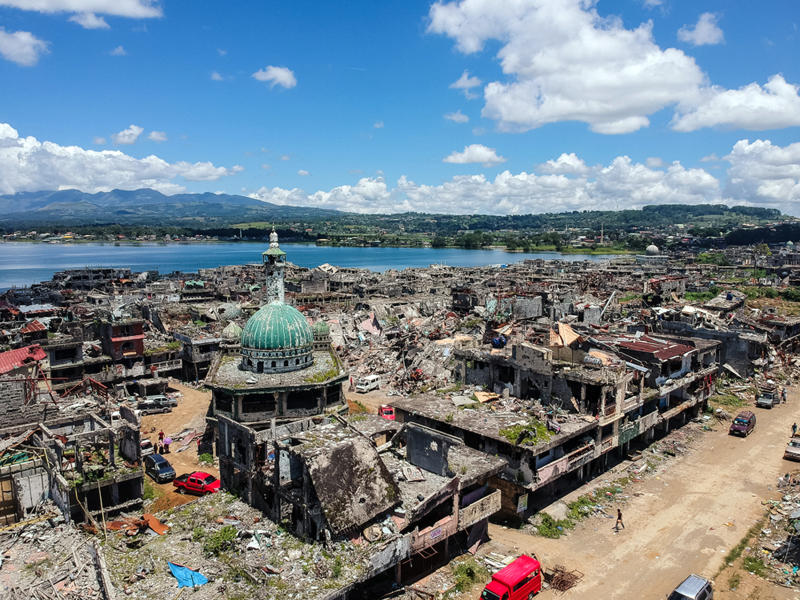Philippine officials say DNA tests confirm death of Abu Dar, last of key plotters of Marawi siege
Sign up now: Get insights on Asia's fast-moving developments

A drone shot of Marawi’s commercial hub, which was destroyed during five months of fighting after pro-ISIS militants stormed and seized control of large parts of Marawi in 2017.
PHOTO: ST FILE
Follow topic:
MANILA - Philippine security officials said on Sunday (April 14) that DNA tests have confirmed the death of the last known surviving leader of an alliance of extremists that laid siege for five months to the southern Philippine city of Marawi two years ago.
Benito Marohombsar was one of the extremists killed in clashes last month. He went by the name Abu Dar, and had also been referred to as Human Abduj Najib.
The information about Abu Dar's death was given by Colonel Romeo Brawner, commander of an army brigade in Marawi, in text messages to reporters. Col Brawner had referred to a report sent by US forensic investigators.
"It is confirmed. It's Abu Dar's remains. Well, for now his group is leaderless," Defence Secretary Delfin Lorenzana told reporters on Sunday.
A source in the military said hair samples between Abu Dar and his children were tested.
"We've known about it since Monday (April 8), but we did not receive the papers till Thursday," he said.
He said President Rodrigo Duterte was supposed to reveal the information during a scheduled visit to Marawi, but the event was cancelled.
Abu Dar was killed with three other militants in Tuburan town in Lanao del Sur province, 880km south of the capital Manila. Marawi city is located in Lanao del Sur.
He was at the time known to be leading Daulah Islamiyah, one of a multitude of factions that drew militants from the Philippines and abroad still fighting for the Islamic State in Iraq and Syria (ISIS).
Security officials said Abu Dar's death signalled the end of Daulah Islamiyah.
Little is known about Abu Dar.
Said to be in his 40s, he was born in Pagayawan town, in Lanao del Sur which is located on Mindanao island.
He was said to have acted as "money courier" during the fighting in the southern Islamic city of Marawi.
About a thousand pro-ISIS militants stormed and seized control of large parts of Marawi in 2017. They held on to the city for five months.
The fighting killed hundreds of people in Marawi, with more than 350,000 displaced, and half the city left in ruins.
The battle for Marawi was the biggest the Philippines had seen since World War II and stoked wider concerns that ISIS had ambitions to turn Mindanao into a base for its operations in the region.
The militants' core leaders were killed, among them Isnilon Hapilon, ISIS' anointed "emir" in South-east Asia.
Abu Dar was seen in seized video footage sitting beside Hapilon.
He managed to flee Marawi, along with nine other plotters of the siege and some 300 fighters, carting off 500 million pesos (S$12.7 million) in cash and valuables they looted from banks, shops and homes in the five months they held on to half the city.
At one point, he was believed to have been named as Hapilon's successor.
Abu Dar's death represent rare progress at a time of heightened alert across the predominantly Muslim areas of war-torn Mindanao island, which makes up the southern third of the Philippines.
Still, the Philippine government is far from rolling back a new wave of extremism sweeping across Mindanao.
ISIS reportedly has a new "acting emir" in the Philippines, Hatib Hajan Sawadjaan, a 60-year-old, uneducated village elder with a propensity for savagery.
Sawadjaan and his small, but brutal, faction in the Abu Sayyaf group reportedly plotted the deadly twin blasts in January that tore through a Roman Catholic cathedral on Jolo island, in the Muslim province of Jolo.
At least 23 people were killed and over 100 injured in the attack.
Pro-ISIS militants are also reported to be fanning out well beyond their enclaves in Mindanao to tap dense urban areas and far-flung towns and villages where they can move around unencumbered by a military drive bent on eradicating them.
Last month, security forces arrested two suspected extremists in Baggao town, in Cagayan province, in the northern tip of the Philippines. ISIS flags were taken from them.

